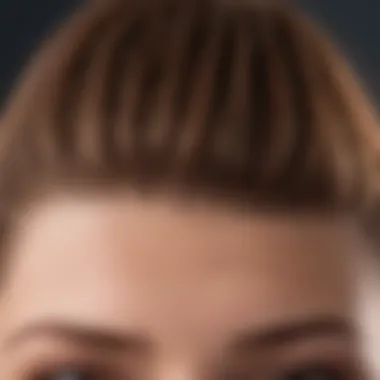Effective Strategies for Boosting Hair Growth and Thickness


Well-Being Overview
A focus on hair growth and thickness is not merely a cosmetic endeavor. It reflects the underlying state of well-being, spanning physical and mental health aspects. An individual's hair is often considered a marker of health, fulfilling various roles that contribute to self-esteem and identity.
In recent years, there has been a noticeable shift toward holistic approaches in healthcare. Understanding the multifaceted nature of hair growth and thickness is crucial. This article discusses effective strategies that are grounded in evidence and research. It will cover essential nutrients, effective supplements, and lifestyle changes that can facilitate healthier hair growth.
Nutrition for Nourishment
A well-balanced diet plays a pivotal role in supporting hair health. Nutritional deficiencies can lead to hair loss or thinning. Here are some points to consider:
- Benefits of a balanced diet: Consuming a variety of nutrients helps maintain optimal body function, hence supporting healthy hair. Key nutrients include vitamins, minerals, and proteins.
- Nutrient-rich food recommendations: Foods like eggs, spinach, sweet potatoes, and nuts provide vitamins A, C, D, E, and essential omega-3 fatty acids that nourish hair follicles.
- Easy and healthy recipes to try: Incorporate a mix of salads and smoothies that include spinach, avocados, and seeds into your daily routine. For instance, a spinach and berry smoothie can be packed with antioxidants and healthy fats.
Mental Health Matters
There is an undeniable connection between mental health and hair growth. Stress and anxiety can impair the hair growth cycle. Therefore, exploring mental well-being strategies is essential:
- Understanding mental health: Mental well-being encompasses emotional and psychological stability. Heightened stress levels can cause conditions like telogen effluvium, leading to increased hair shedding.
- Strategies to improve mental well-being: Mindfulness practices, regular social interactions, and proper sleep hygiene can be beneficial.
- Coping mechanisms for stress and anxiety: Journaling, meditation, and physical activity are effective ways to manage stress.
Mindfulness & Self-Care Practices
Incorporating mindfulness and self-care rituals can enhance overall health and vitality, positively influencing hair condition. This may include:
- Exploring mindfulness techniques: Breathing exercises or yoga can promote relaxation and ease tension, contributing to better hair growth.
- Self-care rituals for rejuvenation: Regular pampering sessions, such as scalp massages with oils like castor oil, can stimulate circulation in the scalp area, promoting hair growth.
- Balancing work and relaxation: Ensure to allocate time for leisure alongside work commitments to maintain a healthy life balance.
Physical Wellness
Physical activity and wellness are interlinked with hair health. Regular exercise provides numerous benefits that extend to hair growth:
- Exercise routines and tips: Aim for at least 150 minutes of moderate exercise each week. Activities may include walking, cycling, or swimming - all contribute to better circulation.
- Healthy eating habits: Pairing your exercise regime with a nutrient-rich diet can amplify positive results on hair health.
- Importance of regular physical activity: Regular exercise not only enhances physical appearance but also boosts mood and overall health, thus indirectly aiding hair growth.
Maintaining a holistic approach, focusing on both nutrition and lifestyle practices, is essential for promoting hair growth and thickness effectively.
Prelims to Hair Growth and Thickness
Hair growth and thickness remain key indicators of overall health and well-being. As such, understanding the underlying processes influencing these factors can significantly contribute to strategies aimed at enhancing hair vitality.
Healthy hair is often seen as a reflection of beauty and self-esteem. Addressing issues related to hair growth is not merely an aesthetic concern but also a matter of personal health. Several factors, including diet, lifestyle choices, and biological processes, play crucial roles in hair density and overall condition. By delving into the specifics of hair anatomy and the growth cycle, individuals can gain insight into methods for fostering healthier and thicker hair.
Understanding Hair Anatomy
To appreciate how to enhance hair growth, one must first understand its structure. Hair consists of three main parts: the cuticle, the cortex, and the medulla. The cuticle is the outer layer that protects the inner layers. It consists of overlapping cells that create a barrier against environmental factors. The cortex contains the bulk of the hair and is responsible for its strength and color. Finally, the medulla is the innermost layer, though not always present, especially in fine hair.
Understanding these components provides a basis for exploring treatments that target specific areas of hair health. For instance, products designed to strengthen the cuticle can prevent breakage and promote a fuller appearance, while those that nourish the cortex may enhance color and shine.
The Hair Growth Cycle
The hair growth cycle is a complex process consisting of three phases: anagen, catagen, and telogen. The anagen phase is the active growth phase, lasting several years. During this time, hair follicles develop and produce hair fibers. The catagen phase follows, signifying a transitional period where growth slows, and the hair follicle shrinks. Lastly, the telogen phase is a rest period when hair falls out and new hair begins to develop in the follicle.
- Anagen Phase: Often lasts 2-7 years
- Catagen Phase: Lasts about 2-3 weeks
- Telogen Phase: Lasts around 3 months
Understanding this cycle is essential for implementing effective strategies. For example, disruptions in any stage can lead to hair thinning or loss. By recognizing these cycles, individuals can adopt practices to support each phase, thereby enhancing overall hair health.
By evaluating hair anatomy and growth cycles, it becomes evident that a multi-faceted approach is necessary for improving hair growth and thickness. This foundation sets the stage for discussing nutritional factors, lifestyle habits, and topical treatments, as each plays a significant role in achieving optimal hair health.


Nutritional Factors Influencing Hair Health
Nutrition plays a crucial role in maintaining not only overall health but also in influencing hair growth and thickness. The body draws upon nutrients to foster hair development, which extends through various stages from growth to shedding. Without the right nutritional support, hair can become thin, brittle, and even prematurely fall out. Therefore, understanding the interplay between nutrients and hair health is essential for anyone seeking to enhance their locks.
Essential Nutrients for Hair Growth
Various nutrients have a direct impact on hair growth. Here are the most significant ones:
Proteins and Amino Acids
Proteins are the building blocks of hair. Hair is primarily composed of a protein called keratin. Amino acids are the organic compounds that combine to form proteins. When your diet lacks adequate protein or specific amino acids, hair might not grow as effectively.
Key characteristic of proteins is the fact that they are involved in every cell in the body. Therefore, they are particularly important in the hair growth process. This makes protein a popular choice for enhancing hair health.
A notable advantage of amino acids is that they help in repairing damaged hair and can promote healthy growth. However, excess protein can leads to brittleness.
Vitamins and Minerals
Vitamins and minerals play a vital role in hair health too. For example, vitamin B12 helps in red blood cell formation that can improve circulation to the scalp, enabling better nutrient delivery to hair follicles.
A unique feature of vitamins and minerals lies in their varied functions. For instance, vitamin E provides antioxidants that reduce oxidative stress, while zinc aids in hair tissue growth and repair. Thus, these nutrients are critical for maintaining healthy hair.
While vitamins and minerals can provide numerous benefits, deficiencies in them can lead to poor hair condition, including thinning and breakage.
Fatty Acids
Fatty acids, specifically omega-3 fatty acids, are also important for hair health. They help nourish hair follicles and promote growth by keeping the scalp hydrated. Omega-3s are found in foods like fatty fish, walnuts, and flaxseeds.
The key characteristic of fatty acids is their role in maintaining a healthy cell membrane, which is crucial for retaining moisture in hair. This makes them a beneficial addition for anyone wanting to enhance hair density.
Unique to fatty acids is how they can reduce inflammation, which is often a contributing factor to hair loss. Despite their benefits, imbalances—such as excessive omega-6 fatty acids—can lead to health issues, including hair problems.
The Role of Hydration
Hydration is fundamental to the resiliency and vitality of hair. Water makes up a significant portion of the hair structure, and insufficient hydration can affect hair growth and thickness. When the body is dehydrated, it might prioritize hydration for essential functions before addressing non-essential areas like hair follicles. Thus, drinking an adequate amount of water daily can support optimal hair health. A hydrated body promotes better nutrient absorption, leading to thicker and healthier hair over time.
"Hydration goes beyond mere water intake; it also encompasses moisture-rich foods that aid in maintaining the overall health of hair."
Dietary Supplements for Hair Enhancement
Dietary supplements play a vital role in enhancing hair growth and thickness. These nutrients complement a well-balanced diet, providing specific vitamins and minerals essential for hair health. Supplements can also address deficiencies that may hinder hair growth. By exploring various supplements, one can better understand their unique contributions to overall hair vitality.
Biotin: The Hair Growth Vitamin
Biotin is often regarded as a cornerstone of hair health due to its role in the synthesis of keratin. Keratin is a key structural protein in hair, nails, and skin. Biotin supplements can improve hair strength and minimize brittleness. Many individuals experience thicker hair after taking biotin, which suggests its effectiveness. While biotin is found in foods like eggs and nuts, supplements provide concentrated dosages that can more effectively address deficiencies.
Collagen and Hair Structure
Collagen is another crucial supplement that contributes to hair structure. It contains amino acids that are vital for the development and growth of hair follicles. By supporting the dermis, the skin layer that houses hair roots, collagen helps maintain a healthy environment for hair growth. Some studies indicate that taking collagen may lead to increased hair density. Regular use of collagen supplements might lead to noticeable changes over time, promoting overall hair thickness and health.
Other Notable Supplements
- Zinc: Zinc is a mineral that promotes hair health by supporting the function of oil glands around hair follicles. It plays a central role in hair repair and growth. A deficiency in zinc can lead to hair loss, making it a vital component in any hair enhancement regimen. Supplements of zinc can boost hair density and prevent thinning. However, too much zinc can lead to adverse effects, thus it is essential to follow recommended dosages.
- Iron: Iron is crucial for carrying oxygen to hair follicles, which is necessary for growth. Low iron levels can lead to hair loss and thinning, especially in women. Supplements can help individuals regain needed levels of iron and improve their hair condition. It's important to monitor intake, as excess iron can lead to issues, such as gastrointestinal discomfort.
- Vitamin D: Vitamin D plays a significant role in the hair growth cycle. It helps create new hair follicles, which can enhance overall hair growth. This vitamin is commonly obtained from sunlight, but supplementation can be helpful for those who have limited sun exposure. Many find vitamin D supplements beneficial for improving hair thickness and health. It’s generally well-tolerated; however, maintaining optimal levels is important to avoid complications related to excess.
"Choosing the right supplements can significantly affect hair thickness and overall health. It is advisable to consult with health professionals before starting any new supplement regimen."


Lifestyle Habits to Promote Hair Growth
Stress Management Techniques
Stress can have a profound effect on hair growth. When the body is under stress, it produces hormones like cortisol that can disrupt the hair growth cycle. Chronic stress may lead to conditions like telogen effluvium, where hair prematurely enters the shedding phase. Thus, managing stress becomes crucial for maintaining hair health.
Techniques for stress management can vary widely and should be personalized. Some effective methods include:
- Mindfulness meditation: This practice helps to center thoughts and reduce anxiety, contributing to a calmer mental state.
- Yoga: Combining physical movement with breathing exercises can lower cortisol levels and promote relaxation.
- Deep breathing exercises: Simple techniques can help relieve tension instantly.
- Engaging in hobbies: Activities that bring joy can effectively divert focus from stressors.
By incorporating these practices into one’s daily routine, individuals can create a stronger foundation for hair growth.
Importance of Sleep
Sleep is a critical, yet often overlooked, factor in hair growth. During sleep, the body engages in repair processes that are vital for overall health. Insufficient sleep can lead to a range of issues, including hormonal imbalances and inflammation, both of which can adversely affect hair follicles. Furthermore, quality sleep enhances the body's ability to absorb nutrients, which is crucial for healthy hair.
To improve sleep quality:
- Establish a regular sleep schedule by going to bed and waking up at the same time every day.
- Create a restful environment by limiting noise and light during sleeping hours.
- Avoid screens before bedtime, as blue light can interfere with sleep cycles.
Prioritizing sleep can lead to noticeable improvements in hair vitality over time.
Exercise and Circulation
Exercise promotes better blood circulation, which is integral to delivering oxygen and nutrients to hair follicles. Improved circulation can stimulate hair growth by ensuring that hair follicles receive what they need to thrive. Additionally, regular physical activity aids in stress reduction and promotes better sleep, creating a positive feedback loop that benefits hair health.
Recommended forms of exercise include:
- Aerobic exercises: Such as running, cycling, or swimming, can effectively boost heart rate and circulation.
- Strength training: Increases blood flow to various body parts.
- Moderate-intensity activities: Such as brisk walking or dancing can also be beneficial.
By integrating these exercises into a daily routine, one may experience enhanced hair growth as part of an overall healthier lifestyle.
"Adopting a holistic approach to hair health encompasses effective stress management, sleep hygiene, and regular physical activity, all contributing to improved hair growth outcomes."
Topical Treatments for Hair Growth
Topical treatments play a crucial role in the quest for enhancing hair growth and thickness. These treatments offer direct benefits to the scalp and hair follicles, ensuring that vital nutrients penetrate effectively. They address various scalp conditions and stimulate the growth phase of hair. The importance of topical treatments cannot be overstated, as they provide both immediate and long-term benefits that are integral to any hair care regimen.
Minoxidil: An Overview
Minoxidil is a well-researched topical solution widely recognized for its effectiveness in promoting hair growth. Originally developed as an oral medication for hypertension, its hair growth properties were discovered incidentally. Applying minoxidil directly to the scalp encourages blood flow to hair follicles, thereby increasing their size and prolonging the growth phase of hair. While some users observe results within a few months, it requires continuous usage for effective maintenance. Side effects can include scalp irritation and unwanted facial hair growth in some individuals, requiring careful consideration before starting treatment.
Natural Oils and Their Benefits
Natural oils serve as excellent adjuncts to enhance scalp health and promote hair growth. They possess various properties that nourish hair follicles and improve overall hair condition, making them a popular choice. Here are three significant natural oils that can be utilized effectively:
Coconut Oil
Coconut oil is renowned for its moisturizing properties. It is rich in lauric acid, which allows it to penetrate hair more deeply than many other oils. This can help reduce protein loss in hair, making it an effective treatment for both damaged and healthy hair. Coconut oil's key characteristic is its ability to provide hydration, leading to shinier and healthier hair. It is a favorable choice due to its availability and versatility, but some individuals may find it heavy and difficult to wash out.
Rosemary Oil
Rosemary oil is celebrated for its potential to stimulate hair growth. It contains antioxidants that may improve blood circulation to hair follicles. Its aroma is also refreshing, making it a pleasant addition to hair care routines. A unique feature of rosemary oil is its ability to combat dandruff and inflammation, which can hinder hair growth. However, some individuals may experience skin irritation, so a patch test is recommended prior to full application.


Castor Oil
Castor oil is known for its high content of ricinoleic acid, which enhances circulation to the scalp. This oil is praised for its thick consistency, which can coat strands effectively and promote a healthier appearance. The key advantage of castor oil lies in its purported capability to enhance hair density and overall texture. Nonetheless, due to its thickness, it may require a more thorough cleansing routine to remove completely from the hair.
"Choosing the right topical treatment can significantly enhance hair growth and thickness, providing both immediate advantages and long-term results."
The Impact of Hair Care Practices
The impact of hair care practices is crucial to understanding how to enhance hair growth and thickness. Proper care can make a significant difference in the health and vitality of hair. Many may underestimate how simple habits related to hair maintenance can influence its general condition. Therefore, being mindful of these factors can yield positive results.
Effective shampoos and conditioners are designed to nourish hair and keep the scalp healthy. Many products contain specific ingredients that target issues like dryness and breakage. Additionally, choosing the right products for individual hair types can prevent potential damage. Using a product that matches one's unique needs can lead to noticeable improvements in hair texture and strength. On the other hand, using harsh cleaning agents can strip hair of essential oils, leading to adverse effects.
Scalp care is another important aspect that often does not receive enough attention. A healthy scalp provides a solid foundation for hair growth. Regular exfoliation encourages blood circulation to hair follicles, stimulating growth. Moreover, maintaining a clean and balanced scalp reduces the chances of dandruff and other skin conditions, which can impede hair health.
"Regular hair care routines can significantly impact the growth rate and thickness of hair, enhancing overall appearance and health."
In summary, reinforcing the hair with appropriate care products and focusing on scalp health can lead to substantial improvements in hair growth and thickness. These practices establish a more robust environment for hair follicles, allowing for optimal growth conditions.
Integrating a Holistic Approach
A holistic approach to enhancing hair growth and thickness involves considering various factors that contribute to hair health. This method emphasizes that hair care is not solely about topical treatments or specific products. Instead, it integrates dietary habits, lifestyle choices, mental well-being, and professional insights. By adopting this comprehensive perspective, individuals can create a more effective strategy that addresses the root causes of hair thinning and breakage.
Holistic practices recognize that the body functions as an interconnected system. For instance, poor nutrition can lead to deficiencies that ultimately impact hair health. Similarly, stress can interfere with hair growth cycles. Therefore, being aware of all interrelated aspects of health can empower individuals to make more informed decisions about their hair care practices.
Understanding Individual Needs
Recognizing individual needs is critical in a holistic approach to hair health. Everyone's hair is different, influenced by genetics, lifestyle, and health conditions. Therefore, a one-size-fits-all solution often proves ineffective.
When assessing personal needs, individuals should consider factors such as:
- Hair Type: Straight, wavy, curly, or coily hair may require different care methods.
- Scalp Health: An oily or dry scalp needs diverse treatment.
- Medical Conditions: Thyroid issues or hormonal imbalances can affect hair growth.
Understanding these unique aspects allows for tailored care routines that can lead to significantly better results.
Consulting with Professionals
Engaging with professionals can offer invaluable insights into effective hair care strategies. Healthcare providers, including dermatologists, nutritionists, and trichologists, can assess individual conditions and recommend suitable treatments or lifestyle modifications. Such consultations can help in:
- Identifying Underlying Issues: Professionals can isolate coexisting health problems affecting hair health.
- Guiding Supplement Usage: Understanding which vitamins and minerals are genuinely needed can prevent unnecessary spending.
- Providing Evidence-Based Recommendations: Experts draw from the latest research to suggest effective hair care practices or products.
"It is essential to consult professionals who understand the systemic connections of health and can cater to individual needs effectively."
By integrating a holistic approach that considers unique characteristics and professional advice, individuals are more likely to achieve improved hair growth and thickness in a sustainable manner. This emphasis on personalized strategies underscored the necessity of viewing hair health as part of a greater wellness narrative.
The Ends and Future Directions
The understanding of strategies to enhance hair growth and thickness is of utmost importance, especially in the realm of health and wellness. This article provides a multifaceted look into various approaches that can be utilized to foster healthier hair. It is imperative to appreciate the interconnectedness of nutritional intake, lifestyle habits, and topical treatments. Each element contributes uniquely to the overall health and vitality of hair, thus demanding an integrated strategy for effective results.
Summary of Key Points
- Nutritional Factors: Essential nutrients such as proteins, vitamins, and fatty acids lay the foundation for healthy hair. A balanced diet rich in these nutrients is vital.
- Supplements: Dietary supplements like biotin and collagen can support hair structure and promote growth, especially in individuals who may have deficiencies.
- Lifestyle Habits: Stress management, adequate sleep, and regular exercise enhance blood circulation to the scalp, thereby promoting hair growth.
- Topical Treatments: Applications such as Minoxidil and various natural oils provide direct benefits to hair follicles and overall scalp health.
- Personalization: Understanding individual needs and consulting with professionals can tailor interventions, maximizing their effectiveness.
Emerging Research in Hair Growth
Emerging research continues to reveal groundbreaking insights into hair growth mechanisms. Recent studies focus on genetic factors influencing hair health, considering how individual biology can create variability in responses to treatments. New methodologies in stem cell research are looking at how hair follicle regeneration can be achieved, offering promise for those facing severe hair loss conditions.
Moreover, there is an increasing interest in the gut-health-hair connection, with studies suggesting that a healthy microbiome may positively influence hair growth. This underscores the potential for holistic approaches that encompass both diet and lifestyle choices to optimize hair health.
In the future, targeted therapies that can address specific hair loss conditions are on the horizon, ideally leading to more effective solutions tailored to genetic predispositions or nutritional deficiencies. Researchers are also assessing the impact of environmental factors and their role in hair health, ensuring a comprehensive understanding of all influences on hair growth.
It is through continuing exploration and advancing knowledge that individuals will be equipped with innovative strategies to foster hair growth and thickness, adhering to both preventive and corrective measures.



